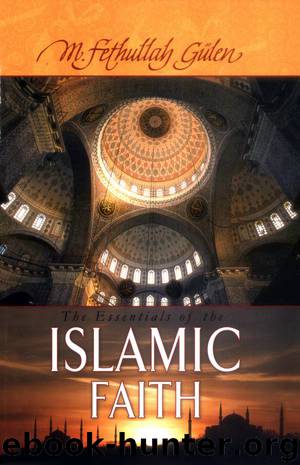The Essentials of the Islamic Faith by M. Fethullah Gulen

Author:M. Fethullah Gulen [M. Fethullah Gulen]
Language: eng
Format: epub
Publisher: Feedbooks (http://www.feedbooks.com)
Published: 2005-06-17T16:00:00+00:00
Qur'anic Arguments
Although scientific findings like the second law of thermodynamics show that existence is on the way to destruction, even a collision of two planets could destroy the universe. If existence began with a big bang, why should it not end with another big bang or collision? Existence is an extremely delicately calculated organism, a system with parts subtly dependent upon each other. A human body is made up of about 60 million million cells. As a single deformed, cancerous cell can kill the entire body, any serious deformation anywhere in the universe also could "kill" it. Our death sometimes comes unexpectedly and without any visible, diagnosed reason. Do we know whether or not the universe might "die" all of a sudden, unexpectedly, from a "disease" or a "heart attack"? Maybe our old world has terminal cancer because we abuse it so.
God's universal acts point to the Resurrection. The Qur'an argues for the Resurrection. To impress upon our hearts the wonder of what the Almighty will accomplish in the Hereafter, and to prepare our minds to accept and understand it, the Qur'an presents the wonder of what He accomplishes here. It gives examples of God's comprehensive acts in the macro-cosmos and, at times, presents His overall disposal of the macro-, normo-, and micro-cosmoses (the universe, humanity, and atoms, respectively).
For example, the following Qur'anic verse stresses God's Power and, by mentioning specific instances of It, calls us to have conviction in our meeting with Him in the Hereafter:
God is He Who raised the heavens without any pillars that you can see, then He established Himself upon the Throne (of authority; having shaped the universe and made it dependent upon certain laws, He exercises His absolute authority over it), and subjected the sun and the moon (to His command); each runs (its course) for an appointed term. He regulates all affair, expounding the signs, that you may believe with certainty in the meeting with your Lord. (13:2)
The first origination of the universe and humanity indicate their second origination. The Qur'an presents the phenomenon of the universe's creation, which it defines as the first origination (56:62), while describing the raising of the dead as the second origination (53:47), to prove the Resurrection. It also directs our attention to our own origin, arguing:
You see how you progressed—from a drop of sperm to a drop of blood, to a blood clot suspended on the wall of the womb, from a suspended blood clot to a formless lump of flesh, and from a formless lump of flesh to human form—how, then, can you deny your second creation? It is just the same as the first, or even easier [for God to accomplish]. (22:5; 23:13-16)
The Qur'an makes analogies between the Resurrection and His deeds in this world, and sometimes alludes to His deeds in the future and in the Hereafter, in such a way that we can become convinced of that which we cannot fully understand. It also shows similar events here and makes comparisons between them and the Resurrection.
Download
This site does not store any files on its server. We only index and link to content provided by other sites. Please contact the content providers to delete copyright contents if any and email us, we'll remove relevant links or contents immediately.
The History of Jihad: From Muhammad to ISIS by Spencer Robert(2628)
Nine Parts of Desire by Geraldine Brooks(2369)
The Turkish Psychedelic Explosion by Daniel Spicer(2357)
The First Muslim The Story of Muhammad by Lesley Hazleton(2271)
The Essential Rumi by Coleman Barks(2046)
1453 by Roger Crowley(2031)
The Last Mughal by William Dalrymple(1858)
Trickster Travels: A Sixteenth-Century Muslim Between Worlds by Davis Natalie Zemon(1847)
Muhammad: His Life Based on the Earliest Sources by Martin Lings(1646)
God by Aslan Reza(1644)
by Christianity & Islam(1633)
A Concise History of Sunnis and Shi'is by John McHugo(1567)
No God But God by Reza Aslan(1545)
Magic and Divination in Early Islam by Emilie Savage-Smith;(1534)
The Flight of the Intellectuals by Berman Paul(1503)
Nothing to Envy by Barbara Demick(1450)
Art of Betrayal by Gordon Corera(1431)
What the Qur'an Meant by Garry Wills(1394)
Getting Jesus Right: How Muslims Get Jesus and Islam Wrong by James A Beverley & Craig A Evans(1342)
